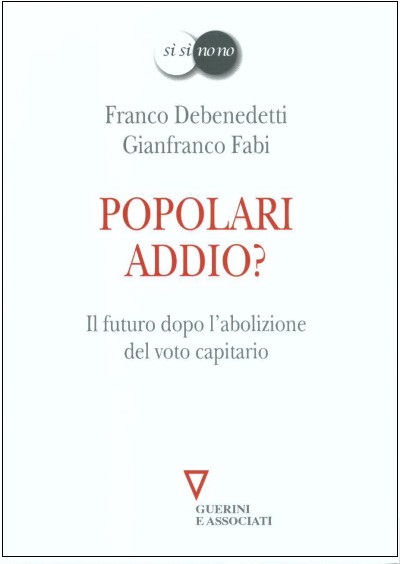→ gennaio 16, 2018

Recensione a
“La quarta evoluzione”
di Luciano Floridi
Editore Raffaello Cortina
304 pp.
Non inganni il titolo. Nella sterminata letteratura sulla società digitale, “The 4th Revolution” è un libro diverso, fin da quel 4 nel titolo che sembra fare il verso a tutti i 3 e 4 che ricorrono nelle periodizzazioni storiche. Diverso perché diversa è la storia, perché a scriverla non è uno scienziato o un tecnologo, un micro- o un macroeconomista, un finanziere o un sociologo, un politico o uno scrittore di fantascienza, ma un filosofo. E al filosofo quello che interessa è l’uomo, e quello che l’uomo pensa, di se stesso e del mondo in cui vive.
leggi il resto ›
→ agosto 1, 2017

Everybody lies.
Big Data, New Data, and What the Internet Can Tell Us About Who We Really Are.
di Seth Stephens-Davidowiz
HarperCollins, 2017
352 pagine
“Non è che Internet ci fa vivere in una bolla cognitiva, con pareti sempre meno porose alle influenze esterne, dove diventiamo sempre più chiusi sulle nostre idee?” In modo dubitativo, me lo sentii chiedere da uno studente, alla fine di una lezione nell’àmbito del programma dell’Istituto Bruno Leoni per le scuole. In modo assertivo, è quello che sostiene Salvatore Bragantini sul Corriere della Sera del 30 Luglio: per lui “Internet mette a rischio la nostra democrazia”. Dubbio o una certezza che sia, il modo per verificare se hanno qualche fondamento nei fatti, era finora l’indagine demoscopica: si seleziona un gruppo di persone in modo che formino plausibilmente un campione della società che si vuole analizzare, gli si fanno delle domande e se ne studiano le risposte. Il metodo è costoso, tanto più quanto più cerca di essere preciso, e soprattutto è esposto a un rischio inevitabile e non misurabile: ciò che l’interrogato risponde (ad esempio sulle proprie intenzioni di voto), è altro da ciò pensa, e questo da ciò che realmente farebbe. Perché mentiamo tutti, mentiamo agli altri perché mentiamo a noi stessi. “Everybody lies” è il titolo del libro di Seth Stephens-Davidowiz, 300 pagine di esempi di come l’analisi dei dati, una disciplina che richiede solide competenze statistiche e matematiche unite a intelligenza sociologica, consenta di rispondere a questo genere di domande: risposte quantitative, mirate per categorie di persone (età, sesso, luogo, religione, educazione), e scevre dal rischio della menzogna. Quando, protetti dall’anonimato della ricerca su un motore di ricerca, invece di rispondere a domande di altri, cerchiamo risposta a domande nostre, noi lasciamo tracce di desideri e di preoccupazioni, di associazioni di idee e di istinti. Big Data è il siero della verità, a volte rivela verità di cui neppure siamo coscienti.
leggi il resto ›
→ ottobre 2, 2016

Recensione a
Italia si cambia. Identikit della riforma costituzionale,
di Giovanni Guzzetta,
Rubbettino, Soveria Mannelli,
pagg. 206, € 15
«Fin dalla fondazione della Repubblica, il discorso pubblico sulle istituzioni ha avuto la transizione come chiave fondamentale di narrazione. L’Italia è stata sempre interpretata come una Repubblica transitoria, una democrazia incompiuta a cui mancano (ancora?) le condizioni politiche e istituzionali perché il gioco democratico si possa svolgere all’insegna della normalità». Per Giovanni Guzzetta le scelte di politica legislativa costituzionale vanno collocate nel contesto, storico, politico, istituzionale: e chiude con queste riflessioni Italia si cambia, il denso libro scritto per fare l’«identikit della riforma costituzionale» del governo Renzi. Il momento della normalità, annota, è stato sempre stato spostato in avanti dal susseguirsi delle eccezionalità: il fascismo, la liberazione, il più grosso partito comunista del mondo occidentale, il terrorismo, Mani pulite, Berlusconi, le crisi da Lehman in avanti. E poiché l’essenza della politica è prospettare un futuro e disegnare le azioni per realizzarlo, per settant’anni la partita politica si è giocata su queste idee, transitorietà e incompiutezza. Nel nome della transitorietà si sono giustificate sia la provvisorietà delle soluzioni deboli sia la fragilità di quelle decisioniste. Nel nome dell’incompiutezza si sono giustificati sia il ruolo maieutico di élite che proteggessero la democrazia dalle spinte populiste o eversive, sia la teoria della convergenza di forze politiche che evitasse il gioco competitivo tra loro.
leggi il resto ›
→ luglio 10, 2015

Il libro del neo ministro
“La crisi greca non è un caso speciale, non deriva dall’incapacità di fare riforme strutturali: rappresenta la crisi del progetto neoliberista”. Apre così il “Crogiuolo della Resistenza”, scritto, insieme a Christos Laskos, da Euclide Tsakalokis, il ministro che ha sostituito Varoufakis. Non è un instant book, è del 2012. Non è un pamphlet, è l’analisi di economisti colti ricca di tabelle e grafici, è il programma di marxisti rigorosi convinti dell’inevitabile fine della “sintesi neoliberista” su cui è costruita l’Europa. Mostra come dietro negoziazioni erratiche e comportamenti stravaganti, ci sia, preparata da anni, una strategia economica che va oltre il momento, propositi politici che vanno aldilà della Grecia.
leggi il resto ›
→ maggio 20, 2015

Presentazione del libro
Popolari addio?
Il futuro dopo l’abolizione del voto capitario.
di Franco Debenedetti e Gianfranco Fabi
2015, Guerini e Associati
20 Maggio 2015 – ore 18.00
Centro Studi Americani e Formiche – Via M. Caetani 31 – Roma
Ne parlano con gli autori:
Michele Arnese – Direttore formiche.net
Lodovico Festa – Giornalista e direttore della collana Si Si No No
Modera:
Paolo Messa
leggi il resto ›
→ marzo 8, 2015

by Robert Rosenkranz
The economist’s book caused a sensation last year, but now he says the redistributionists drew the wrong conclusions.
‘Capital in the 21st Century,” a dense economic tome written by French economist Thomas Piketty, became a publishing sensation last spring when Harvard University Press released its English translation. The book quickly climbed to the top of best-seller lists, and more than 1.5 million copies are now in circulation in several languages.
The book’s central proposition, that inequality in capitalist societies will inevitably grow, can be summed up with a simple equation: r>g. That is, the return on capital (r) outpaces the growth rate of the economy (g) over time, leading inexorably to the dominance of inherited wealth. Progressives such as Princeton economist Paul Krugman seized on Mr. Piketty’s thesis to justify policies they have long wanted—namely, very high taxes on the wealthy.
Now in an extraordinary about-face, Mr. Piketty has backtracked, undermining the policy prescriptions many have based on his conclusions. In “About Capital in the 21st Century,” slated for May publication in the American Economic Review but already available online, Mr. Piketty writes that far too much has been read into his thesis.
Though his formula helps explain extreme and persistent wealth inequality before World War I, Mr. Piketty maintains, it doesn’t say much about the past 100 years. “I do not view r>g as the only or even the primary tool for considering changes in income and wealth in the 20th century,” he writes, “or for forecasting the path of inequality in the 21st century.”
Instead, Mr. Piketty argues in his new paper that political shocks, institutional changes and economic development played a major role in inequality in the past and will likely do so in the future.
When he narrows his focus to what he calls “labor income inequality”—the difference in compensation between front-line workers and CEOs—Mr. Piketty consigns his famous formula to irrelevance. “In addition, I certainly do not believe that r>g is a useful tool for the discussion of rising inequality of labor income: other mechanisms and policies are much more relevant here, e.g. supply and demand of skills and education.” He correctly distinguishes between income and wealth, and he takes a long historic perspective: “Wealth inequality is currently much less extreme than a century ago.”
All of this takes the wind out of enraptured progressives’ interpretation of Mr. Piketty’s book, which embraced the r>g formulation as relevant to debates playing out in Congress. Writing in the New York Review of Books last May, for example, Mr. Krugman lauded the book as a “magnificent, sweeping meditation on inequality.” He wrote that Mr. Piketty has proven that “we haven’t just gone back to nineteenth-century levels of income inequality, we’re also on a path back to ‘patrimonial capitalism,’ in which the commanding heights of the economy are controlled not by talented individuals but by family dynasties.”
The r>g formulation always struck me as unconvincing. First, Mr. Piketty’s definition of r as including “profits, dividends, interest, rents, and other income from capital” conflates returns on real business activity (profits) with returns on financial assets (dividends and interest).
Second, it ignores the basic rule of economics that when supply of capital increases faster than demand, the yield on capital falls. For instance, since the great recession, the money supply has grown far more rapidly than the real economy, driving down interest rates. Returns on government bonds, the least risky asset, are now close to zero before inflation and negative 1% to 2% after inflation. In today’s low-return environment, with the headwinds of income and estate taxes, it becomes a Herculean task to build and transmit intergenerational wealth.
Many mainstream economists had reservations about Mr. Piketty’s views even before he began walking them back. Consider the working paper issued by the National Bureau of Economic Research in December. Daron Acemoglu and James A. Robinson, professors at the Massachusetts Institute of Technology and Harvard, respectively, find Mr. Piketty’s theory too simplistic. “We argue that general economic laws are unhelpful as a guide to understand the past or predict the future,” the paper’s abstract reads, “because they ignore the central role of political and economic institutions, as well as the endogenous evolution of technology, in shaping the distribution of resources in society.”
The Initiative on Global Markets at the University of Chicago asked economists in October whether they agreed or disagreed with the following statement: “The most powerful force pushing towards greater wealth inequality in the U.S. since the 1970s is the gap between the after-tax return on capital and the economic growth rate.” Of 36 economists who responded, only one agreed.
Other critics have questioned the trove of statistical data Mr. Piketty assembled to chart trends in income and wealth in the U.S., U.K., France and Sweden over the past century. Are such diverse data comparable, and have the adjustments that Mr. Piketty introduced to make them comparable distorted the final picture?
After an extensive review, Chris Giles, the economics editor of the Financial Times, concluded in May last year that “Two of Capital in the 21st Century’s central findings—that wealth inequality has begun to rise over the past 30 years and that the U.S. obviously has a more unequal distribution of wealth than Europe—no longer seem to hold.”
Mr. Piketty is willing to stand up and say that the material in his book does not support all the uses to which it has been put, that “Capital in the 21st Century” is primarily a work of history. That is certainly admirable. Now it is time for those who cry that we are heading into a new gilded age to follow his lead.
![]()









